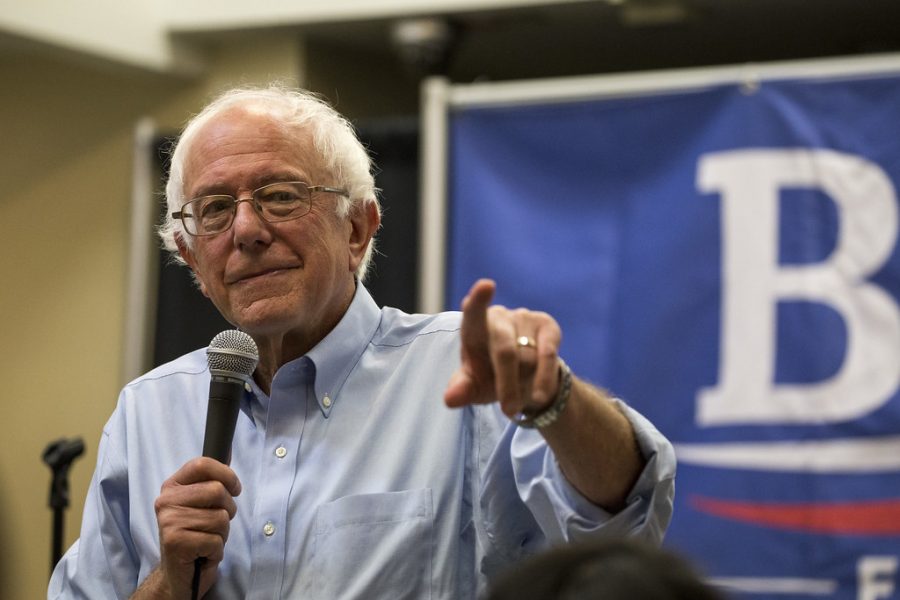Was social democracy the answer all along?
Phil Roeder/ Bernie Sanders for President
Public opinion on these matters has largely shifted over the past few weeks. It’s now more in line with the likes of Sen. Bernie Sanders and social democracy (defined as a market economy with a strong, collectivist social safety net).
April 14, 2020
We are in a crisis right now the likes of which are seldom seen. Consequently, this crisis has driven a national conversation regarding which policies can be implemented to aid the American people.
These policies have included industry nationalization, direct universal cash payments, insurance premium moratoriums and more. Public opinion on these matters has largely shifted over the past few weeks. It’s now more in line with the likes of Sen. Bernie Sanders and social democracy (defined as a market economy with a strong, collectivist social safety net). What changed? America faced a pandemic that drastically exposed its lack of readiness and underscored its need for these socioeconomically stimulative policies. Neoliberal mainstream pundits now actively praise social democratic policies as though they weren’t smearing them just a few weeks ago. In fact, it seems like there really are almost no fiscal conservatives in a crisis.
To those few that still try to pretend Medicare for All (or similar policies) wouldn’t be of any help in this crisis, let’s be clear: it absolutely would. People who try to claim otherwise (including presumptive Democratic nominee Joe Biden) often cite Italy and Spain as examples of single-payer not adequately combatting the crisis. However, it’s important to remember that the U.S. is number one in global COVID-19 cases, exceeding Spain and Italy by more than 400,000 cases and thousands of deaths each, according to WorldOMeters. The actual difference is likely even greater due to our testing shortages. Furthermore, Spain and Italy are much denser countries, which allows for a much easier spreading of the virus. This easier spreading is further exacerbated by them having up to the second oldest population in the world (the U.S. is 36th), on top of ventilator and bed shortages, all of which combined clearly explain their current situation. With our healthcare system, these countries would be even worse off.
Still, access to healthcare is essential. The U.S. fails massively on this front. Inherently, countries with single-payer systems like most in western Europe have had zero deaths due to lack of access to care, both before and during this crisis. There, healthcare is free at the point of service. Here, in the U.S., a Yale University study just recently concluded that American deaths due to lack of healthcare is an annual 68,000, along with the country having 500,000 medical bankruptcies every year, a foreign concept in many other nations. For these reasons and more, the U.S. consistently ranks worst in the developed world for healthcare outcomes.
The Coronavirus Emergency Aid Package was riddled with leverageable trillions in corporate bailouts, yet even it shows how seriously people are taking policies that, not long ago, would’ve been deemed ridiculous or perhaps radical. Support for Universal Basic Income (direct, periodic cash payments to Americans), for instance, underwent this surge in popularity. On March 2, it polled at 33%, according to DataForProgress. Just two weeks later, it polled at 58% and is now likely even higher. Morning Consult reported that Medicare for All just hit a nine-month high, and Common Dreams reported that paid leave has strong support, along with 75% supporting free treatment and vaccines.
Of course, while many politicians are using the present predicament as an opportunity to advance their career by touting their belief in free COVID-19 treatment or vaccines, this is too often contradictory. Presidential candidates like Former Vice President Joe Biden are a prime example; he has repeatedly tweeted about how COVID-19 treatment should be available free of charge. However, he is against free-at-the-point-of-service treatment for literally everything else, including diabetes, heart disease and others. His advocacy of free COVID-19 treatment is a good start, but it is despicable that Biden would veto the same approach to any other disease.
As large stimulus spending increasingly becomes the near-unanimous solution, Americans must consider other crises too. Is the 68,000 annual deaths due to lack of basic healthcare not a crisis? How about 500,000 annual medical bankruptcies? What about $1.7 trillion in student loan debt, or having 550,000 homeless people (40,000 of which are veterans)? Are these not crises that require lots of top-down action, albeit to varying degrees? Of course they are. Though we now have injected trillions into the stock market and corporate bailouts (the first $500 billion of which lasted a mere hour before a bear market), the benefits to the American people have been relatively milquetoast, leaving millions without any aid at all, and many more with massive delays.
Yet after this gargantuan stimulus spending, barely anyone asked, “how are we going to pay for it?” This persistent conservative talking point was nowhere to be found. When it’s to save the deified Dow Jones or NASDAQ, or, historically, when it’s for a $7 trillion Iraq War and Trump’s multi-trillion dollar tax cuts, the Fed has no problem writing a blank check. None of those were paid for. It’s only when it’s for the American people that questions of payment arise, especially when companies like McDonald’s actively rail against these relief policies.
Of course, this massive crisis spending has brought many to a new revelation: even though it certainly can be, government action doesn’t have to be completely paid for. In fact, most things the government does aren’t. That’s why we have a $24 trillion national debt. This is how we can address the previously mentioned crises. Modern Monetary Theory suggests that the American dollar, like most non-backed currencies, has no intrinsic or inherent value. The only thing that makes it not worthless is its demand, which is artificially created through taxation. You cannot submit your taxes in cattle, nor can you in crops, Euros, Pounds, or any other currency; it must be in dollars. Therefore, the mere existence of taxation creates demand for the American dollar, raising its value and making it a ‘fiat’ currency. MMT advocates view taxation as a means of preventing inflation by limiting supply, within reason, as well as increasing the dollar’s demand.
However, one must know that taxes and bonds do not and cannot pay for spending. Many might think that banks, as an example, can only loan out whatever they currently have. This used to be true under the gold standard, but a vast majority of bank money issued today isn’t printed out; it is literally just typed into existence in the form of credit. The same monetary approach is true for the government. America is a sovereign nation that controls its own currency. If we need to, we can just mark up the account a bit. In this process, the U.S. government can’t go bankrupt because that would mean it ran out of dollars to pay creditors. But, as Dylan Matthews of Vox explained, the U.S. can’t run out of dollars because only it can create them: “It would be like a bowling alley running out of points to give players.”
Obviously, a nation must be careful, mostly with respect to inflation. But combining such stimulative government spending with slightly higher taxation to necessarily keep people from bidding up prices, as economist Stephanie Kelton noted, is a good safeguard. Still, MMT advocates reject the notion that inflation usually results from excessive aggregate demand; they believe it comes from predatory monopolists artificially pushing up prices. Most MMT advocates also believe in a job guarantee, which they believe could curb any potential economic slowing due to tax increases.
That’s a lot to think about, but those more abstract ideas are the guiding force behind many of the stimulus discussions today. This healthcare crisis is sure to have a lasting impact on policy across the country, moving the ‘Overton window’ closer to social democracy. When the crisis is averted (which should be our priority right now), MMT, Medicare for All and debt cancellation are sure to be on the table. It’s about time.








